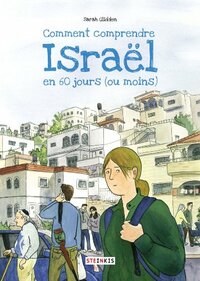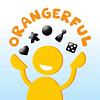You need to sign in or sign up before continuing.
Take a photo of a barcode or cover
medium-paced
adventurous
challenging
slow-paced
I was disappointed that Sarah Glidden didn't push herself to come to any sort of conclusion on the Palestinian/Israeli conflict. In fact, the deeper one goes in this book, the more she embraces ambiguity and fear. At first, the tension of knowing/not knowing, seeking experience to understand a situation, and trying not to draw facile conclusions, works. She's young, she's learning, she's trying to be all savvy but maybe she's a little bit naive. That's all fine.
But as the book works its way along, she becomes a less sympathetic, less reliable narrator, unwilling to examine her own biases. If the taglit trip did nothing else, it surely encouraged her to magnify fear and paranoia, to the point where she never went to meet any Palestinians, to get their perspectives. This seems unfortunate...human, yes, and ok, for her own personal experience and trip, but if you're going to write a book about it, there is a certain responsibility to do your work, and she doesn't take it up, nor does she give any sort of follow-up that would own this and describe what she did after the trip to learn first-hand from the Palestinian perspective.
The text comes off as rather privileged and naive.
But as the book works its way along, she becomes a less sympathetic, less reliable narrator, unwilling to examine her own biases. If the taglit trip did nothing else, it surely encouraged her to magnify fear and paranoia, to the point where she never went to meet any Palestinians, to get their perspectives. This seems unfortunate...human, yes, and ok, for her own personal experience and trip, but if you're going to write a book about it, there is a certain responsibility to do your work, and she doesn't take it up, nor does she give any sort of follow-up that would own this and describe what she did after the trip to learn first-hand from the Palestinian perspective.
The text comes off as rather privileged and naive.
This was a great companion read to [b: Mornings in Jenin|6692041|Mornings in Jenin|Susan Abulhawa|https://d.gr-assets.com/books/1312020216s/6692041.jpg|311976]. It gave me an Israeli perspective on the uber complicated and chaotic Palestinian-Israeli conflict. Given that I knew very little about the conflict before I started to really read and think about it this month, getting to see how populations on both sides of the conflict justify and communicate their rationale for the actions taken was valuable. This particular graphic-memoir is told by an American Jew who travels to Israel on the Birth-right trip which is an all-expense paid trip for Jews throughout the world to get a few weeks to visit Israel. Sarah Glidden travels to Israel with more than a little skepticism about the Zionists occupation of Israel and the justification of the expulsion of the native Palestinians & Bedouins. It is an interesting view of how conflicted she is as a Jew in Israel and gives a glimpse into the rationale used to propagate the fighting. Worth reading to get a balanced perspective and enable a reader to come to their own conclusions (or in my case, find myself even less able to take a firm stance. "Supporting peace" does not seem like a particularly productive statement once you understand all the complexities a bit better. There needs to more concrete suggestions about how to achieve that peace but those suggestions are illusive.
informative
reflective
medium-paced
At some points it hit me that this might be my closest encounter with Israil; Through illustrated frames. I started reading it by the purpose of hearing something from the other side. Instead I ran into a seemingly fair and almost impartial story, that doesnt give you any answers, just narrates (and simultaneously criticises) the story, and leaves the concluding part to you.
I'm sure I will go back to this book someday probably really soon.
Keep in mind, you might need some pre-data which will be found on the very last page of this book.
I'm sure I will go back to this book someday probably really soon.
Keep in mind, you might need some pre-data which will be found on the very last page of this book.
IM SO TORN. The watercolor art, first off, is top notch and lovely. The story, Glidden's travel memoir of a Jewish Birthright tour through Israel, is fascinating. But I found Glidden to be an unsympathetic, at times irritating narrator- I perceived a frustrating sense of superiority in her judgement/distance from many of her other tour mates (how she was asked to design a tour group sweatshirt, bitched about it, and then refused to order one, for example) because she had loftier reasons for touring... that is, attempting to affirm her political beliefs of the Palestine/Israel situation. While she does ultimately conclude the situation is far more complicated than she could've ascertained from her home in the US, her attitude never really resolves enough for me to sympathize.
1. A hilariously spot on memoir of Birthright. Yes, it's propaganda, yes, you think you're aware of it, no, you can't opt out of any of it, yes, the kibbutzers kind of hate us all.
2. A still (unsurprisingly?) relevant take on how complex I/P geopolitical conflict is, and just when you think you understand part of it, NOPE, here's some more information. As Americans, we have the luxury of _thinking_ about it, and not _living_ in it, which also skews our perspectives and divorces us from lived reality of the people in the land.
2. A still (unsurprisingly?) relevant take on how complex I/P geopolitical conflict is, and just when you think you understand part of it, NOPE, here's some more information. As Americans, we have the luxury of _thinking_ about it, and not _living_ in it, which also skews our perspectives and divorces us from lived reality of the people in the land.
This was a very personal and honest story that Glidden shares with us. It centers around her coming to terms with thinking she knows it all and realizing that she doesn't. I think it is a problem a lot of us have when it comes to looking at issues in other countries and societies. She points this out at the end of the book - that it is much easier to look elsewhere and say how easy it would be to solve a problem than looking at our own country and what needs to be fixed.
This book made me realize how little I actually know about the story of Israel and Palestine. I feel the need to do some research, maybe not to try to solve the problem, which is clearly complex and layered, but to have a better grasp on what is at stake when people talk about steps forward.
This book made me realize how little I actually know about the story of Israel and Palestine. I feel the need to do some research, maybe not to try to solve the problem, which is clearly complex and layered, but to have a better grasp on what is at stake when people talk about steps forward.
Amazing detail in artistry and capturing the detail of israel; but the conclusions drawn by the narrator are lacking due to her absence of communication with any Palestinians whatsoever. So this really isn't your one-stop book for everything you need to know before heading out on Birthright, and to think so is dangerous.
This book gave me so many hits of nostalgia it was crazy! The woman's story is so relatable, and not just for me, but for many people who have taken group tours of Israel. It gives you a perspective that you don't get to see often, until you experience it yourself. Of course, it is mostly just another woman going on a Birthright Trip and describing her experience. But, it gives you a sense of normalcy about the state of Israel, without being too biased to one side or the other. It gives you a normal perspective, and any American Jew can relate to this woman's experience. The writing isn't particularly amazing, but the fact that it actually sounds like a normal person like me going about my life, it makes it easier to read and understand.





